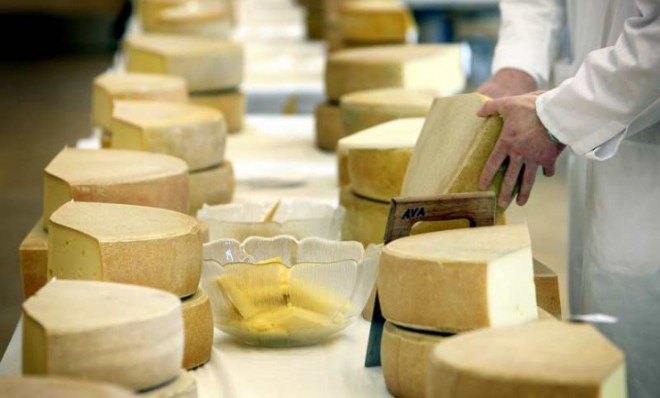Why did humans start eating cheese in the first place?
Whoever thought it would be a good idea to snack on coagulated, old milk: Thank you

A free daily email with the biggest news stories of the day – and the best features from TheWeek.com
You are now subscribed
Your newsletter sign-up was successful
Cheese is nearly unrivaled in its culinary versatility, as comfortable on a silver platter as it is on a greasy slice of pizza. But if you take a moment to think about it, cheese is a pretty strange thing to eat. Really, who thought it would be a good idea to give smelly, old, coagulated milk — swimming with bacteria, no less — a taste in the first place?
Our early prehistoric ancestors, it turns out. A new study of 7,500-year-old pottery pieces found in the Polish region of Kuyavia found pretty convincing evidence of early cheese-making. Researchers at the University of Bristol in Britain analyzed fatty acids embedded in the nooks and crannies of the ceramics (which bore a striking resemblance to modern cheese strainers) and found that they were used to separate milk into curds (the stuff we mold into cheese) and whey (the cloudy, lactose-rich stuff we take out). The milk residue found in the ancient sieves "constitutes the earliest direct evidence for cheese-making," said study co-author Mélanie Salque, writing in the journal Nature.
But why start eating cheese in the first place? According to Paul Kindstedt, author of Cheese and Culture: A History of Cheese and Its Place in Western Civilization, cheese gave early humans an abundant protein source that was easier to store and transport than milk. Plus, cheese allowed humans to avoid slaughtering precious livestock for food.
The Week
Escape your echo chamber. Get the facts behind the news, plus analysis from multiple perspectives.

Sign up for The Week's Free Newsletters
From our morning news briefing to a weekly Good News Newsletter, get the best of The Week delivered directly to your inbox.
From our morning news briefing to a weekly Good News Newsletter, get the best of The Week delivered directly to your inbox.
Another mark in cheese's favor: It was easier to digest for our adult ancestors than milk, especially since most were likely lactose intolerant. "All mammals including humans naturally produce lactase at birth, which enables the newborns to digest their mothers' milk," writes Kindstedt.
However, lactase production normally declines in mammals after weaning and does not persist into adulthood. Therefore, when adult humans consume milk, the lactose remains undigested and disrupts the gut microflora, triggering a number of noteworthy side effects such as explosive diarrhea, flatulence, and bloating.
Curds, on the other hand, thanks to the separation and removal of the lactose (i.e., the whey), were easier to digest in modest amounts, and it probably didn't take long for our ancestors to realize it. This allowed grown-ups to enjoy protein-rich dairy for the first time, and you the pizza, nachos, and grilled-cheese sandwiches you scarf down today.
As for who actually discovered cheese, sadly, that will likely remain a mystery, although it's fun to speculate about how the happy accident occurred. Maybe an early traveler opened a container of milk only to discover it had somehow curdled after a hot day. And just maybe they were curious and brave enough to give the weird-looking stuff a try.
A free daily email with the biggest news stories of the day – and the best features from TheWeek.com
-
 6 of the world’s most accessible destinations
6 of the world’s most accessible destinationsThe Week Recommends Experience all of Berlin, Singapore and Sydney
-
 How the FCC’s ‘equal time’ rule works
How the FCC’s ‘equal time’ rule worksIn the Spotlight The law is at the heart of the Colbert-CBS conflict
-
 What is the endgame in the DHS shutdown?
What is the endgame in the DHS shutdown?Today’s Big Question Democrats want to rein in ICE’s immigration crackdown